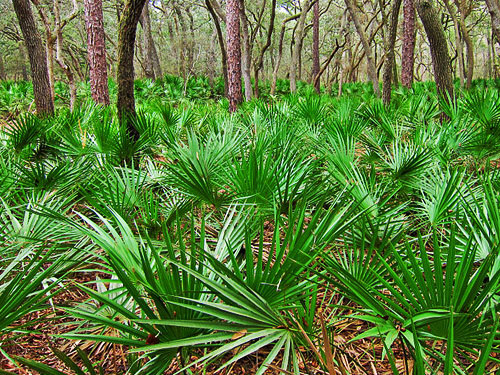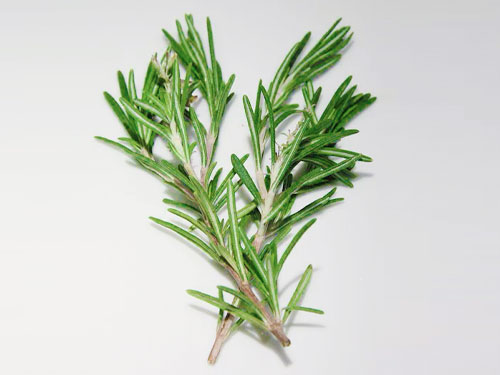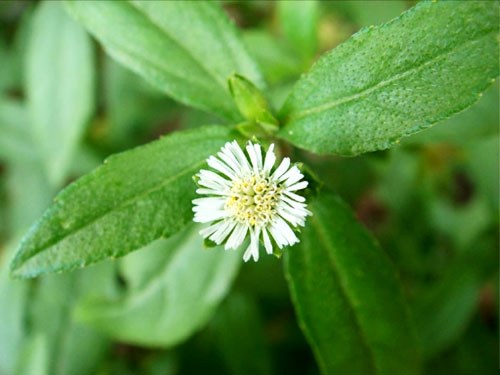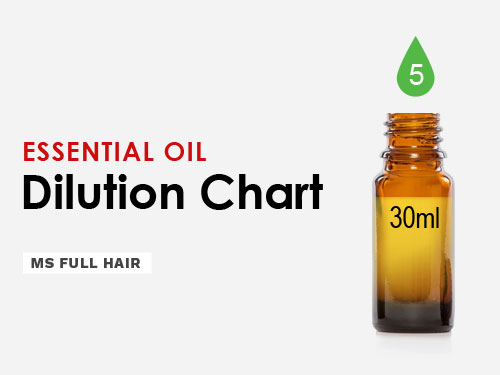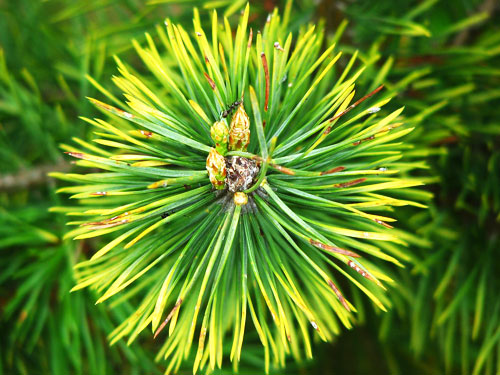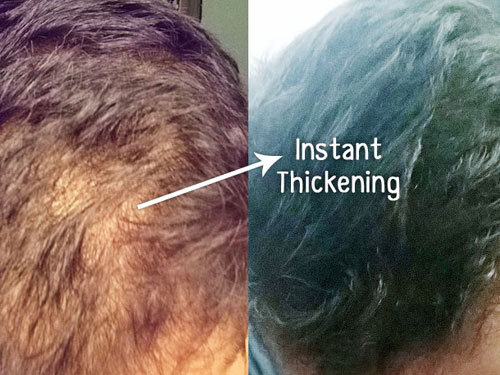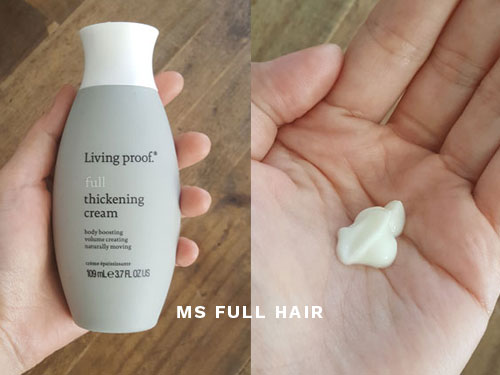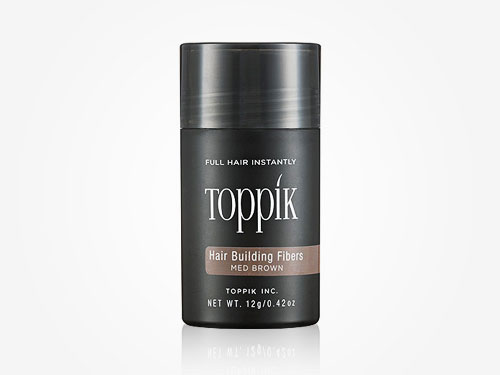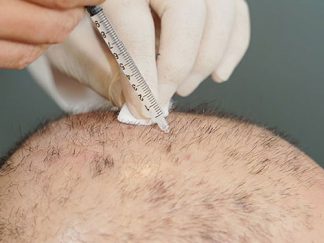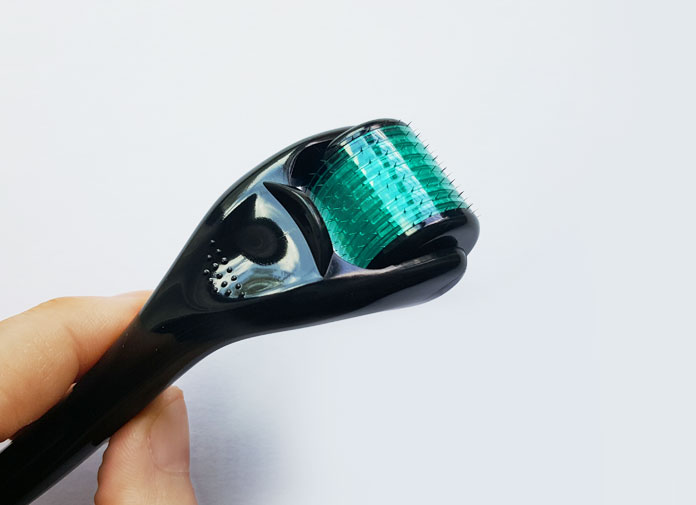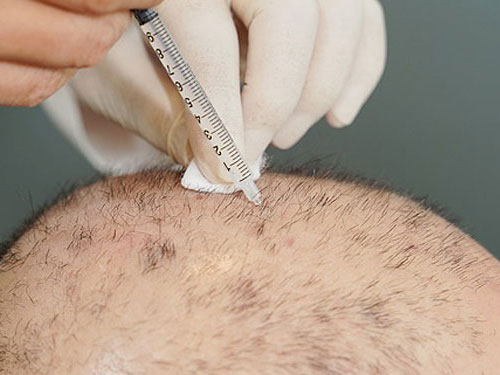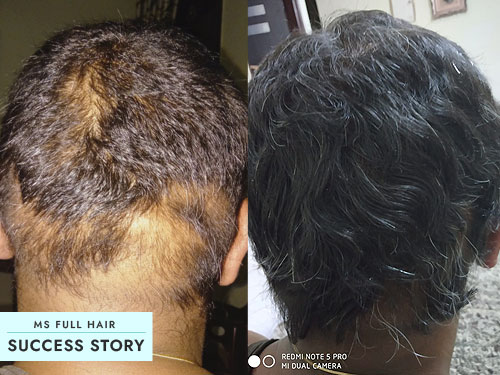Pine needle is a powerful antioxdiant, anti-inflammatory and antibacterial agent. One study discovered that a pine needle extract acts as an effective hair growth stimulant and its result was as good as minoxidil in terms of hair counts and dermal thickness when tested in mice.
Benefits
✓ Prevents hair loss
✓ Stimulates hair regrowth
Growth Recipe?
Yes (See Below)
Our Pick
Now 100% Pure Pine Needle OilA sip of pine needle tea…
This probably doesn’t sound so familiar in the western world.
However, pine needles are more than just a tea ingredient in East Asian countries.
These miraculous leaves have been used for centuries in both medicinal and dietary purposes.
Packed with vitamins and minerals, a large number of studies show powerful healing properties of pine needles for treating a wide range of symptoms from a vascular disease to hair loss.
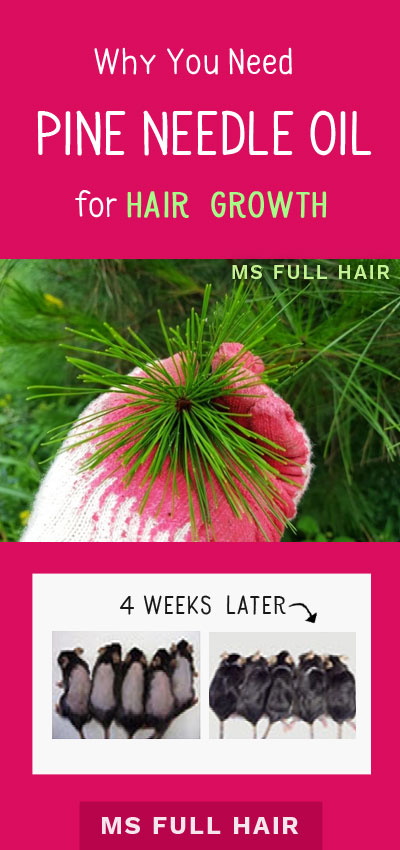
In this article, we will briefly touch on the general health benefits of using pine needles.
Then, we will get more specific on using pine needles to help with reversing hair loss.
Next, we will share a fascinating research study on pine needle extract for inducing hair growth with before and after photo results.
Towards the end of the article, you will find out how to use pine needles in your daily hair loss regime.
Let’s get started.
What is pine (and pine oil)?
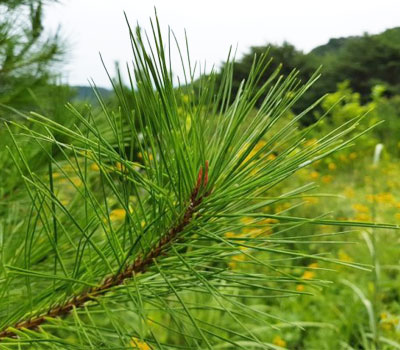
Pine is an coniferous evergreen tree with distinct long and skinny needle-shaped leaves.
There are over 100 varieties of pine species found in different regions around the globe.
For instance, red pine trees called pinus densiflora are predominant in both Korea and China, while white pine trees such as pinus strobus and pinus monticola are widespread in North America.
When it comes to pine essential oil, it can be come from the cones, bark, twigs, pine needles, or a combination of all of them.
This article focuses on pine needles.
What are the health benefits of pine needle oil?
First, here are general uses and health benefits of pine needles according to a number of research studies (we will get into the details for some of the points below):
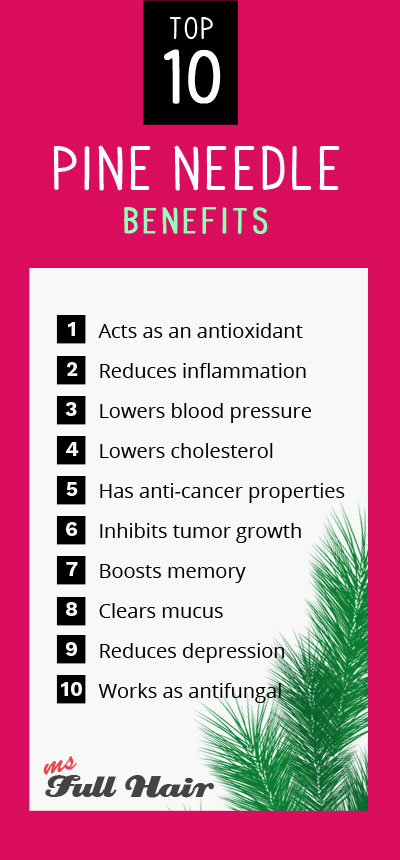
- Acts as an antioxidant
- Reduces inflammation
- Lowers blood pressure
- Lowers cholesterol
- Has anti-cancer properties
- Inhibits tumor growth
- Boosts memory
- Clears mucus
- Reduces depression
- Works as an antifungal agent
3 Major benefits: Why using pine needles for hair growth is a good idea
Here are three main benefits of pine needle oil for hair growth:
Pine needle lowers cholesterol (which in turn can lower the risk of hair loss)
A 2008 study (1) notes that self-fermented pine needle extract lowers the risk of cardiovascular related diseases by regulating blood plasma cholesterol and triglyceride in mice.
So what does cholesterol have to do with hair loss?
Hair follicles need healthy arteries: Well, there is no doubt that our body needs cholesterol for various functions from producing hormones to building cell tissues.
But it becomes an issue when too much cholesterol exists in the body. High cholesterol (LDL) can start developing unwanted fatty deposits in your arteries, causing blood vessels to shrink and eventually block blood pathways in the worst case scenario.
This also causes negative impacts to hair follicles as the narrow blood vessels cause malnutrition and prevents hairs from growing properly.
Western diet & hair loss: A recent study (2) from John Hopkins indicates that a western diet (aka high fat and high cholesterol diet) directly contributes to not only skin inflammation, but premature hair loss and hair greying when tested in mice.
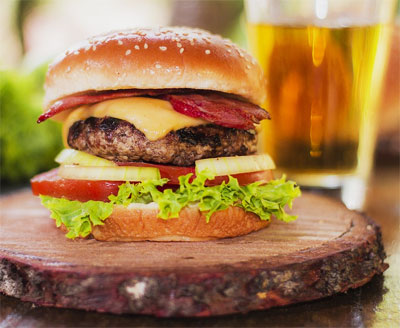
Baldness and heart disease: Another group of researchers (3) also found an interesting correlation between male pattern baldness during their 11 years of follow up.
They observed that vertex baldness is a strong indicator of heart disease risk in men with a high level of cholesterol or high blood pressure (hypertension).
The research also finds that men with both high cholesterol and the late stage of male pattern hair loss (baldness on vertex and crown areas) have THREE times more heart disease risk, compared to men with high cholesterol, but no baldness.
What makes pine needles appealing here is its natural ability of reducing cardiovascular related disorders. One study finds that catechin, an active compound of pine needle extracts, is the main driver of decreasing high blood pressure when tested in mice.
Pine needle is a powerful antioxidant
Several studies note that pine needles show strong antioxidant activities against free radicals.
According to a 2009 study (4), the researchers observed that pine extract from needles in water worked as a protective barrier against a series of proteins that can cause oxidative DNA damage by hydroxyl radical (the most reactive form of free radical).
Providing an antioxidant environment is also crucial for healthy hair growth.
It works by protecting our body from free radicals that damage cell structures and decrease hair production.
One study (5) shows how free radicals have a direct effect on hair loss. When a group of researchers topically applied lipid peroxides (cause of free radicals) on hair follicles in mice, it interfered with the anagen phase (hair growth phase) and caused apoptosis (death) of hair follicle cells.
Even though the study was performed on mice, it still proves the danger of free radicals in relation to hair growth and shows why paying attention to an antioxidant-rich diet is important.
Pine needle has both anti-inflammatory and anti-bacterial / fungal properties
If you ever suffer from scalp folliculitis, pine needles may come very handy.
Scalp folliculitis refers to infected hair follicles due to bacterial or fungal inflammatory reactions.
Pine needle contains an organic molecule compound called terpene – a natural essential oil found in various plants.
Alpha-pinene, a type of terpenes abundant in pine needles, is known to provide anti inflammatory effects according to a couple of research studies.
A 2014 study (6) points out that pine needles are also rich in terpenoids (a compound related to terpene) which provide antioxidant, antibacterial and antifungal benefits.
Direct study on using pine needles for hair growth
According to a 2013 study (7), the researchers discovered that pine needle extract makes a powerful hair growth stimulant.
Study Pine needle extract as a natural hair growth stimulant
In the experiment, 60 mice were randomly divided into 4 groups (2 control and 2 active groups):
- Group A: Saline
- Group B: 3% Minoxidil
- Group C: 2% Pine needle extract
- Group D: 4% Pine needle extract
The liquid compound for each group was topically applied onto the mice twice a day, six days a week, for a total of 4 weeks.
The results?
First, here are the comparison photos:
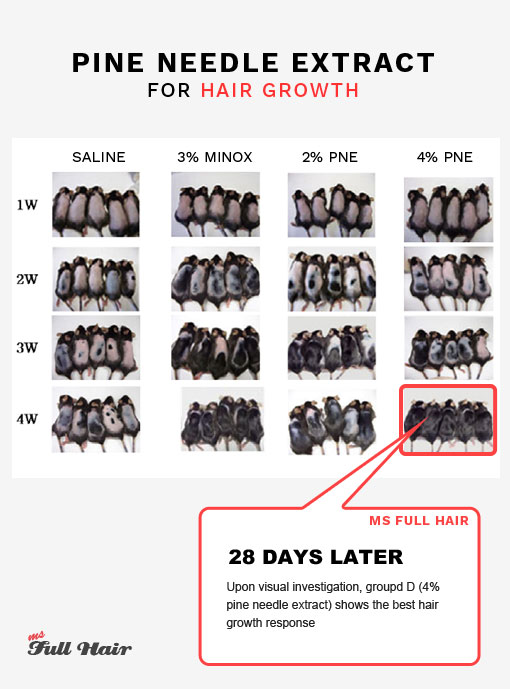
As you can see above, the amount of hair growth among those four groups are significantly different at the end of the week 4.
Hair counts:
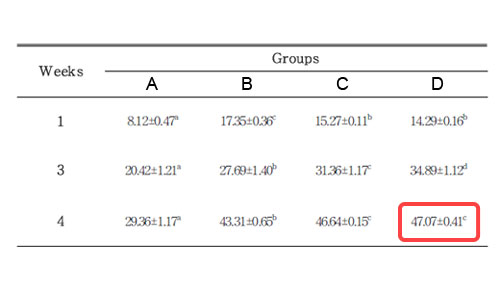
Both pine needle extract groups (group C with 2% PNE and group D with 4% PNE) showed significant increases in hair count.
Group D (4% PNE) shows a slightly higher hair count than group C (2% PNE).
Follicle depth & dermal thickness:
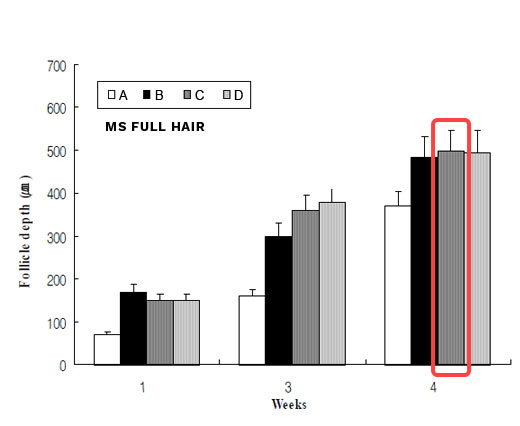
When analyzing changes in hair follicle depth and dermal thickness, group C (2% PNE) showed the best results in both areas, closely followed by group D (4% PNE).
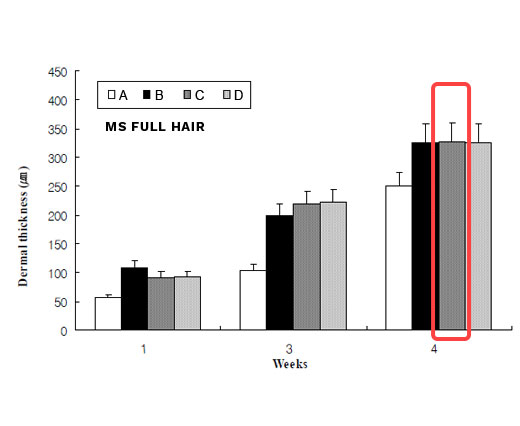
The increase in follicle depth and dermal thickness are characteristic of the anagen (hair growth) phase.
What does the study result indicate?
The researchers concluded the following:
#1: Pine needle could be a great natural alternative to minoxidil for the use of stimulating hair growth
The above data, as well as hair growth related hormone analysis (VEGF, IGF-1, ALP to name a few), indicate that the topical application of pine needle extract helps stimulate hair growth. And it appeared to work better than minoxidil in terms of hair count, follicle depth and dermal thickness.
#2: 2% Pine needle extract may be as potent as the 4% version.
The study results show that while 4% pine needle extract resulted in the most increase in hair count, 2% pine needle extract was slightly more effective for increasing follicle depth and dermal thickness.
How to use pine needles for hair growth?
There are basically two ways.
#1. Consume it
The best way to consume pine needles is in the form of supplements and pin needles tea.
Where to buy pine oil? Unfortunately, there are NOT many options here. This is one of the red pine needle oil supplements we found in a form of capsules.
And here is a wild pine needle tea that should last you many months.
#2. Topically apply it
The pine oil for hair growth research used a topical application method which resulted in significant increase in hair counts, dermal thickness and follicle depth.
Fortunately, NOW sells 100% pure pine needle oil here.
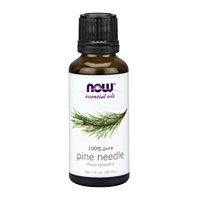
Now Pine Needle Oil
If you are planning to use pine needle oil for reversing hair loss, refer to this simple recipe.
Hair recipe – How to use pine needle oil for stimulating hair growth
RECIPE Using pine needle essential oil for hair loss
Ingredients
- 36 drops of pure pine needle oil
- 6 tsp (30ml) of Grapeseed oil (refer to this post to learn more about grapeseed oil)
- Amber glass bottle with a dropper
Directions
- Add both oils in the amber glass bottle
- Mix them well by gently shaking the bottle
- Apply several drops of the mixture onto the thinning hair area
- Massage the oil onto the scalp for 5-10 minutes
How often?
Apply the oil to a hair thinning spot twice a day
How long?
Repeat the process for at least 4 weeks to see results
Side effects
While pinus densiflora, red pine tree, is popularly used for both consumption (tea, supplement, etc) and topical application in China and Korea, not all pine trees appear to be safe.
For instance, a 1989 study (8) notes that ponderosa pine needles may cause abortion in pregnant cows.
For a general recommendation, avoid consuming pine needles if you are pregnant or breastfeeding.
Also note that since there are over 100 species of pine trees, many of them are still under investigation for its benefits as well as side effects.
Final Takeaway
Can I use pine oil for hair loss?
Whether you are using pine needle oil for treating scalp folliculitis or hair loss, various studies confirm that pine needle is a powerful medicinal herb with antioxidant, anti inflammatory, and antibacterial properties.
While direct studies about pine oil for hair growth were performed on mice, it still shows a promising outcome as a natural hair growth stimulant.
By increasing hair count, dermal thickness and follicle depth in 4 weeks, pine needles can be a great addition of hair growth oil for the topical application use.
Or next time, consider a cup of a pine needle tea when you need extra antioxidant and inflammatory benefits in the body!
Have you tried pine needles for your health (or for hair growth) in the past? Share your experience in the comment.

